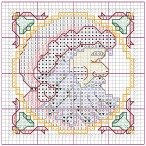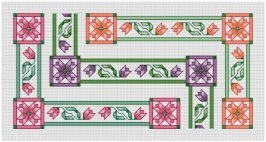Finish Every Cross Stitch
Project You Start
No matter how skilled, everybody makes mistakes.
Here's how to finish every cross stitch project, in spite of them.

I recently went through a period where I couldn't stitch very often. Thankfully, life has calmed down and finally I'm back to cross stitching. For the first couple of weeks, though, it seemed I was taking out one stitch for every two good ones.
Then, I had to remove a large area of white stitching on white fabric, when I was so close to having the project completed.
I was frustrated. I was in a hurry. I just wanted to get on with it.
So instead of carefully removing the stitches individually with my needle, I used my handy dandy, curved-tip, titanium embroidery scissors. What could be quicker?
And those sharp little scissors clipped right through the white fabric instead.
Yikes! "Haste makes waste" was ringing in my ears.
As embarrassing as it is, I wanted to share this to assure all new stitchers that we all make mistakes. And it doesn't matter that you make them, it only matters how you handle them when you do.
Maybe my policy will work for you. If I make a mistake, I fix it immediately. The tendency is to put the project down and come back to it later. But then, instead of being excited to stitch again, I procrastinate because I know that the first thing I'll encounter is a problem that needs fixing.
So even if I had already planned to stop stitching at that time, I do whatever I have to do to fix my mistakes before I quit. This ensures that I am always anxious to get back to my cross stitch project.
How
to Finish Every Cross Stitch Project You Start
 |
 |
 |
Recognize the 3 stages to any project
While studying project management back in my corporate days, I learned to identify these three stages of every project:
Stage 1: The idea stage. This is exciting--it's when you brainstorm, and an idea transforms into a tangible project. You start implementing your plans, finding your resources and getting started.
Stage
2: This is a critical stage. Just when you think that everything is
sunshine and roses, you start to encounter problems. You get
frustrated. You struggle as things don't go the way you'd planned.
Why is this a critical stage? Because it is the stage when many people give up. But keep reading . . .
Stage 3: Euphoria! You have forged ahead, worked through all the problems, and have completed your project. You have pride in what you have accomplished!
Nothing succeeds like success
Now you are ready to take on the next project, any project, secure in the knowledge that no matter what, you can overcome the obstacles and come out ahead on the other side.
If you give up at Stage 2, it is very likely that you will continue to repeat that pattern. Plan a project, start the project, then quit when there are problems. And you do that over and over and over again.
Why? Because you never made it to Stage 3. Since you quit too early, you didn't experience the satisfaction and rewards of a job well done. You didn't gain the confidence that comes from facing your problems head on, divining a solution, and finishing the path to success.
The good news is that, while you can't always control what happens to you, you have complete control over how you handle it. If you find you have a string of uncompleted projects, decide now that you will finish every cross stitch project from this point on.
For me, it's easier if I fix my mistakes right away so that I am always excited about stitching again.
Now, before I finish for the night, I'm off to figure out exactly how to repair the hole I made in my fabric.
Home › Learning the Stitches › Finish Every Cross Stitch
